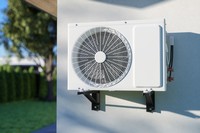How much do air conditioners cost? The price of an air conditioner mostly depends on its type, capacity (which has to be appropriate for the room where it’s installed) and, of course, the bidder. A classic 2HP air conditioner with a single indoor unit and a single outdoor unit is roughly priced between NGN250,000 and NGN350,000. The price of installation ranges between NGN8,000 - NGN25,000 without installation kits. Ceiling cassettes and floor standing air conditioners cost around NGN600,000 for 3HP or more, and their installation is also more expensive. It’s recommended that the filters should be cleaned at least once during the season. If the filters are damaged, they should be replaced. You should also have your AC checked at least once a year. The basic service costs around NGN5,000 and NGN10,000 or more depending on the position of the AC on the building.
Who should you entrust with AC installation and servicing? Send an enquiry to relevant AC professionals in your area with reviews, free of charge and no strings attached! All you need to do is fill in the form below.








your quality
unit
indicative price
your price
Many people decide to get an AC for their flat, house, office, to keep the temperature at a pleasant level usually during the summer.
Type of dwelling—Are you buying the AC for your flat, house, or office?
Age—Is this a new or an old build?
Size—What size is the room youre buying the AC for?
Insulation—Is this room insulated? If yes, how?
Direction—Does this room face the north, south, west, or east? Is this room on, beyond, or above the ground level, or in the attic?
Openings—How many windows and doors are there, and whats their size? Are they glazed with standard or thermally insulated glass?
Number of occupants and devices—How many people will stay in this room? What kind of devices are there?
Ventilation method—Do you use natural or heat recovery ventilation?
Installation conditions—Choosing the type of indoor unit according to the area specifications (a wall-mounted AC, floor standing AC, ceiling cassette, window AC, built-in AC)
Condensate drainage method—drain fall vs automatic pump.
Heating—In addition to cooling, would you also like to use the AC for heating?
The amount of noise coming out of an AC is also something worth considering when choosing one. Appliances usually have a label specifying all technical data, including the noise level in decibels. If the label says 25-30 dB, this means that the appliance is pretty quiet.
When looking at the capacity, consider the size of the room you want to cool down/heat. Other factors worth considering include number of windows, doors, ceiling height, and the floor level. For a 25 sqm room, a 2.5 kW AC will suffice, a 40 sqm room would require a 3.5 kW AC, and so on.
ACs available on the market vary in energy ratings. This range spans from A+++ to D, where A+++ is the most efficient, while D is the least efficient. High energy efficiency means lower electricity bills. For instance, an inverter AC featuring a compressor in its outdoor unit ensures balanced work of the indoor unit, so theres less need to turn it on, which results in lower power consumption.
There are numerous suppliers and contractors out there, but how can you find the right one?
The first good sign is if they offer a warranty. Suppliers of high-quality ACs give a 24-month warranty and if they install it, too, you get a 24-month warranty on the workmanship, as well.
Good installation is crucial. Poor installation may compromise all advantages of a good AC. A big plus for a supplier is having their own authorized installers and repair persons, as this will help them get a good insight and detailed inspection of all works and materials. This does not just guarantee a good quality of the AC itself, but also the quality of installation and performance. Its very important that a customer can call a repairer whenever theyre in need of one, that the response be quick and everything fixed as soon as possible.
Suppliers quality can also be certified through relevant documentation provided after the completed work. In addition to technical specifications of the AC itself, there are also quality and energy efficiency certificates, professional certificates, etc.
Portable air conditioners can be freely transferred from one room to another. Theyre a great choice for small spaces, which cool down or overheat quickly, such as caravans, where other air conditioning devices are not an option. Their biggest downside is low capacity, while the greatest advantage is that no installation is required.
Window ACs are usually mounted on top of window sills, so that theyre partly inside the room and partly out. They must be installed within a suitable opening. Since their installation is so impractical, theyre not used that frequently.
These air conditioners are suitable for rooms where outdoor units cant be installed, while the indoor unit is installed against an outside-facing wall. Youll need two openings of 16 cm in diameter, so that the outside air can cool down the condenser. When it comes to capacity, efficiency, and noise level, this type is on a par with split ACs.
Split air conditioners are the most popular type. As their name suggests, they include two or more separate units. The indoor unit is installed inside a room, while the outdoor unit is installed outside. Indoor units can be mounted on the wall, ceiling, floor, they can come in the form of a cassette, or be ducted. There are also systems with multiple indoor units and a single outdoor unit, which activates them. This is called multi split air conditioning. This system takes up less space and is easier to install. Split air conditioners are cost-effective, they vary in capacity, but theyre extremely energy efficient.
It goes without saying that its very important to choose the right AC. However, if you want it to function properly in optimal conditions, it has to be properly and professionally installed. This is the only way you can secure a pleasant temperature level for your home. No matter if you decide to make this your DIY project or a hire a professional, its always important to choose the right place where to mount the units.
If you live in an apartment block, before you install an outdoor unit, you should check what kind of facade works are allowed, if any. If youre planning to mount it somewhere visible, ensure it wont cause harm to anyone or anything. Outdoor units mounted on a balcony cant be seen from the street. Those who live on the top floor might consider mounting the outdoor unit on the roof or inside the roof structure.
If you’re thinking about mounting an outdoor unit on a listed building, you have to get a consent from the local authority. Even if this is not the case, you still have to make sure its as concealed as possible (on a balcony, in the roof structure, on a flat roof, etc.), so that it doesnt ruin the buildings appearance and that it doesnt bother your neighbours.
You should particularly make sure that the support brackets are firm, have the required bearing capacity, are able to withstand vibrations, without passing them on to the walls.
Outdoor units mounted on the ground, must be fastened to a plastic stand, whose height is at least 10 cm.
Another condition important for a properly functioning AC is free circulation of air between units. Its not a good idea to install them inside a narrow wall recess, against the wall, or next to the concrete balcony handrail.
They shouldnt be installed next to a bedroom or kids room window either. The noise produced by the AC will disrupt your sleep whenever the window is open.
An indoor unit should always be installed at the hottest place in a room—once this place is cooled down, the entire room will be pleasant to be in.
Installing an AC above a frequently used door would make it less energy efficient, since cooling/heating would intensify every time the door is closed or opened.
Installations in corridors, behind curtains, or above wardrobes are also not a good idea as air circulation would be limited, which would impair the performance.
You shouldnt mount an indoor unit next to a heat source either. Indoor units feature a thermostat that makes sure the temperature level is steady, so it would keep turning on even when the room has cooled down.
The first step towards installing an AC involves mounting support brackets for both the outdoor and indoor unit. This is followed by drilling holes through the wall to run tubes (drain hose and connecting pipes/cables), where the correct distance between the two units is crucial. Once the tubes are run through the wall, and the indoor unit is mounted on the brackets, connect it to the power supply, and then proceed to deal with the drain and vent hose. After this, mount the outdoor unit on the brackets and connect the power cable. Once both units are connected to power supply, what we need is venting. This will help remove moisture and air from the refrigerant system with a vacuum pump. The first time you turn the system on, test the hoses and valves for air leakage. Wrap a few winds of insulation tape around the hoses connecting to the outdoor unit and secure them to the wall. Extra spaces in the wall openings should be sealed with spray foam, after which you can apply grout or plaster or install a plastic cover.
People do want to save some money, but they also want to protect the environment. Modern air conditioners will attend to both of these needs, which are growing exponentially and will continue to do so.
Thanks to cutting-edge technology, air conditioners can now connect to WiFi. Smart air conditioners make it possible to easily and practically control your homes temperature via a mobile app. This also helps save energy significantly.
Modern air conditioners have a variable speed, which contributes to their efficiency.
This helps the system run with more accuracy and adjust to the cooling/heating needs of your home. What
s more, installation of these air conditioners doesnt require drilling a hole through the wall to run a hose.
Demand for geothermal heating and cooling systems keeps growing mostly due to energy efficiency.
In addition, geothermal systems are durable and very efficient.
Based on the reliable information provided by sensors in modern air conditioners, you can detect the amount and type of harmful particles in the air. These sensors are connected to filters which automatically take in polluted air and filter it out, and bring in clean and fresh air.
Daibau community is helping you with cost estimates, tips, information and selection of the right contractor for your home
AC EXPERT
AC EXPERT 0.0396 ₦ to 0.066 ₦
I need an Ac technician
Location
8 osabomeh close olokonla road sangotedo beside Readington international school
0.0198 ₦ to 0.033 ₦
I need AC technician
My AC is not working 0.06534 ₦ to 0.1089 ₦





















Receive the best tips, ideas and insights in top designs every month for free!